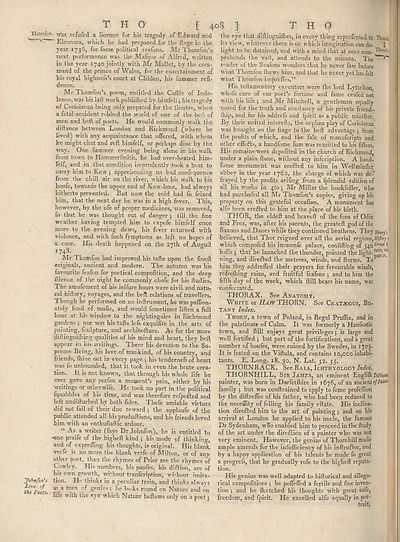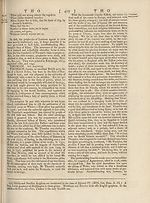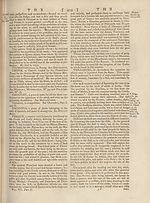Encyclopaedia Britannica, or, a Dictionary of arts, sciences, and miscellaneous literature : enlarged and improved. Illustrated with nearly six hundred engravings > Volume 20, SUI-ZYM
(454) Page 408
Download files
Complete book:
Individual page:
Thumbnail gallery: Grid view | List view

T H O
fhornfon. refufed a licence for his tragedy of Edward and
v"Eleonora, which he had prepared for the ftage in the
year 1736, for fome political reafons. Mr Thomfon’s
next performance was the Mafque of Alfred, written
in the year 1740 jointly with Mr Mallet, by the com¬
mand of the prince of Wales, for the entertainment of
his royal highnefs’s court at Clifden, his fummer reii-
dence.
Mr Thomfon’s poem, entitled the Caftle of Indo¬
lence, was his laid work publifhed by himfelt; his tragedy
of Coriolanus being only prepared for the theatre, when
a fatal accident robbed the world of one of the bed of
men and belt of poets. He would commonly walk the
diftance between London and Richmond (where he
lived) with any acquaintance that offered, with whom
he might chat and rtrft himfelf, or perhaps dine by the
way. One fummer evening being alone in his walk
from town to Hammerfmith, he had over-heated him*
felf, and in that condition imprudently took a boat to
carry him to Kew j apprehending no bad confequence
from the chill air on the river, which his walk to his
boufe, towards the upper end of Kew-lane, had always
hitherto prevented. But now the cold had fo feized
him, that the next day he was in a high fever. This,
however, by the ufe of proper medicines, was removed,
fo that he was thought out of danger ; till the fine
weather having tempted him to expofe himfelf once
more to the evening dews, his fever returned with
violence, and with fuch fymptoms as left no hopes of
a cure. His death happened on the 27th of Auguit
1748.
Mr Thomfon had improved his tafte upon the fineft
originals, ancient and modern. The autumn was his
favourite feafon for poetical compofition, and the deep
filence of the night he commonly chofe for his fludies.
1 he amufement of his leifure hours were civil and natu¬
ral hiftory, voyages, and the belt relations of travellers.
Though he performed on no inflrument, he was paffion-
ately fond of mufic, and would fometimes liflen a full
hour at his window to the nightingales in Richmond
gardens ; nor was his tafte lefs exquifite in the arts of
painting, fculpture, and archite&ure. As for the more
diftinguiftung qualities of his mind and heart, they beft
appear in his writings. There his devotion to the Su¬
preme Being, his love of mankind, of his country, and
friends, ftiine out in every page j his tendernefs of heart
was fo unbounded, that it took in even the brute crea¬
tion. It is not known, that through his whole life he
evem gave any perfon a moment’s pain, either by his
writings or otherwife. He took no part in the political
fquabbles of his time, and was therefore refpe&ed and
left undifturbed by both fides. Thefe amiable virtues
did not fail of their due reward ; the applaufe of the
public attended all his productions, and his friends loved
him with an enthufiaftic ardour.
“ As a writer (fays Dr Johnfon), he is entitled to
■one praife of the higheft kind ; his mode of thinking,
and of exprefling his thoughts, is original. His blank
verfe is no more the blank verfe of Milton, or of any
other poet, than the rhymes of Prior are the rhymes of
Cowley. His numbers, his paufes, his diction, are of
his own growth, without tranfcription, without imita-
Johnfan's tion. He thinks in a peculiar train, and thinks always
ibTpSu a" 3 nian °f gen!uS ; lie lo"ks round on Nature and on
life with the eye which Nature bellows only on a poet j
T H G
the eye that diftinguifhes, in every thing reprefented to Thomf*
its view, whatever there is on which imagination can de- II
light to be detained, and with a mind that at once com- Thornlli
prehends the vail, and attends to the minute. The
reader of the Seafons wonders that he never faw before
what Thomfon fnews him, and that he never yet has felt
what Thomfon imprefles.”
His teftamentary executors were the lord Lyttelton,
whofe care of our poet’s fortune and fame ceafed not
with his life •, and Mr Mitchell, a gentleman equally
noted for the truth and conitancy of his private friend-
fhip, and for his addrefs and fpirit as a public minifter.
By their united interefts, the orphan play of Coriolanus
was brought on the ftage to the beft advantage ; from
the profits of which, and the fale of manuferipts and
other effedts, a handfome fum was remitted to his fillers.
His remains were depofited in the church of Richmond,
under a plain ftone, without any infeription. A hand¬
fome monument was erefted to him in Weftminfter
abbey in the year 1762, the charge of which was de¬
frayed by the profits arifing from a fplendid edition of
all his works in 4*° i Mr Millar the bookfeller, who
had purchafed all Mr Thomfon’s copies, giving up his
property on this grateful occafion. A monument has
alfo been erefted to him at the place of his birth.
THOR, the eldeft and braveft of the fons of Odin
and Frea, was, after his parents, the greateft god of the
Saxons and Danes while they continued heathens. They Henris
believed, that 1 hor reigned over all the aerial regions, tfe/wye
which compofed his immenfe palace, conlifting of 540 Great
halls ; that he launched the thunder, pointed the light-
ning, and directed the meteors, winds, and ftorms. ToP
him they addreifed their prayers for favourable winds,
refreftiing rains, and fruitful feafons ; and to him the
fifth day of the week, which ftill bears his name, was
confecrated.
THORAX. See Anatomy.
White or THORN. See Cratjegus, Bo¬
tany Index.
Thorn, a town of Poland, in Regal Pruffia, and in
the palatinate of Culm. It was formerly a Hanfeatic
town, and ftill enjoys great privileges j is large and
well fortified ; but part of the fortifications, and a great
number of houfes, were ruined by the Swedes, in 1703.
It is feated on the Viflula, and contains 10,000 inhabi¬
tants. E. Long. 18. 30. N. Lat. 52. 55.
THORNBACK. See Raia, Ichthyology Index.
THORNHILL, Sir James, an eminent EngliftiD/to*
painter, was born in Dorfetlhire in 1676, of an ancient
family ; but was conftrained to apply to fome profeffion
by the diftrefles of his father, who had been reduced to
the neceflity of felling his family eftate. His inclina¬
tion diredled him to the art of painting j and on his
arrival at London he applied to his uncle, the famous
Dr Sydenham, wlk> enabled him to proceed in the ftudy
of the art under the direflion of a painter who was not
very eminent. However, the genius of Thornhill made
ample amends for the infufficiency of his inftru&or, and
by a happy application of his talents he made fo great
a progrefs, that he gradually rofe to the higheft reputa¬
tion.
His genius was well adapted to hiftorical and allego¬
rical compofitions ; he poffeffed a fertile and fine inven¬
tion ; and he Iketched his thoughts with great eafe,
freedom, and fpirit. He excelled alfo equally in por¬
trait,
[ 408 ]
fhornfon. refufed a licence for his tragedy of Edward and
v"Eleonora, which he had prepared for the ftage in the
year 1736, for fome political reafons. Mr Thomfon’s
next performance was the Mafque of Alfred, written
in the year 1740 jointly with Mr Mallet, by the com¬
mand of the prince of Wales, for the entertainment of
his royal highnefs’s court at Clifden, his fummer reii-
dence.
Mr Thomfon’s poem, entitled the Caftle of Indo¬
lence, was his laid work publifhed by himfelt; his tragedy
of Coriolanus being only prepared for the theatre, when
a fatal accident robbed the world of one of the bed of
men and belt of poets. He would commonly walk the
diftance between London and Richmond (where he
lived) with any acquaintance that offered, with whom
he might chat and rtrft himfelf, or perhaps dine by the
way. One fummer evening being alone in his walk
from town to Hammerfmith, he had over-heated him*
felf, and in that condition imprudently took a boat to
carry him to Kew j apprehending no bad confequence
from the chill air on the river, which his walk to his
boufe, towards the upper end of Kew-lane, had always
hitherto prevented. But now the cold had fo feized
him, that the next day he was in a high fever. This,
however, by the ufe of proper medicines, was removed,
fo that he was thought out of danger ; till the fine
weather having tempted him to expofe himfelf once
more to the evening dews, his fever returned with
violence, and with fuch fymptoms as left no hopes of
a cure. His death happened on the 27th of Auguit
1748.
Mr Thomfon had improved his tafte upon the fineft
originals, ancient and modern. The autumn was his
favourite feafon for poetical compofition, and the deep
filence of the night he commonly chofe for his fludies.
1 he amufement of his leifure hours were civil and natu¬
ral hiftory, voyages, and the belt relations of travellers.
Though he performed on no inflrument, he was paffion-
ately fond of mufic, and would fometimes liflen a full
hour at his window to the nightingales in Richmond
gardens ; nor was his tafte lefs exquifite in the arts of
painting, fculpture, and archite&ure. As for the more
diftinguiftung qualities of his mind and heart, they beft
appear in his writings. There his devotion to the Su¬
preme Being, his love of mankind, of his country, and
friends, ftiine out in every page j his tendernefs of heart
was fo unbounded, that it took in even the brute crea¬
tion. It is not known, that through his whole life he
evem gave any perfon a moment’s pain, either by his
writings or otherwife. He took no part in the political
fquabbles of his time, and was therefore refpe&ed and
left undifturbed by both fides. Thefe amiable virtues
did not fail of their due reward ; the applaufe of the
public attended all his productions, and his friends loved
him with an enthufiaftic ardour.
“ As a writer (fays Dr Johnfon), he is entitled to
■one praife of the higheft kind ; his mode of thinking,
and of exprefling his thoughts, is original. His blank
verfe is no more the blank verfe of Milton, or of any
other poet, than the rhymes of Prior are the rhymes of
Cowley. His numbers, his paufes, his diction, are of
his own growth, without tranfcription, without imita-
Johnfan's tion. He thinks in a peculiar train, and thinks always
ibTpSu a" 3 nian °f gen!uS ; lie lo"ks round on Nature and on
life with the eye which Nature bellows only on a poet j
T H G
the eye that diftinguifhes, in every thing reprefented to Thomf*
its view, whatever there is on which imagination can de- II
light to be detained, and with a mind that at once com- Thornlli
prehends the vail, and attends to the minute. The
reader of the Seafons wonders that he never faw before
what Thomfon fnews him, and that he never yet has felt
what Thomfon imprefles.”
His teftamentary executors were the lord Lyttelton,
whofe care of our poet’s fortune and fame ceafed not
with his life •, and Mr Mitchell, a gentleman equally
noted for the truth and conitancy of his private friend-
fhip, and for his addrefs and fpirit as a public minifter.
By their united interefts, the orphan play of Coriolanus
was brought on the ftage to the beft advantage ; from
the profits of which, and the fale of manuferipts and
other effedts, a handfome fum was remitted to his fillers.
His remains were depofited in the church of Richmond,
under a plain ftone, without any infeription. A hand¬
fome monument was erefted to him in Weftminfter
abbey in the year 1762, the charge of which was de¬
frayed by the profits arifing from a fplendid edition of
all his works in 4*° i Mr Millar the bookfeller, who
had purchafed all Mr Thomfon’s copies, giving up his
property on this grateful occafion. A monument has
alfo been erefted to him at the place of his birth.
THOR, the eldeft and braveft of the fons of Odin
and Frea, was, after his parents, the greateft god of the
Saxons and Danes while they continued heathens. They Henris
believed, that 1 hor reigned over all the aerial regions, tfe/wye
which compofed his immenfe palace, conlifting of 540 Great
halls ; that he launched the thunder, pointed the light-
ning, and directed the meteors, winds, and ftorms. ToP
him they addreifed their prayers for favourable winds,
refreftiing rains, and fruitful feafons ; and to him the
fifth day of the week, which ftill bears his name, was
confecrated.
THORAX. See Anatomy.
White or THORN. See Cratjegus, Bo¬
tany Index.
Thorn, a town of Poland, in Regal Pruffia, and in
the palatinate of Culm. It was formerly a Hanfeatic
town, and ftill enjoys great privileges j is large and
well fortified ; but part of the fortifications, and a great
number of houfes, were ruined by the Swedes, in 1703.
It is feated on the Viflula, and contains 10,000 inhabi¬
tants. E. Long. 18. 30. N. Lat. 52. 55.
THORNBACK. See Raia, Ichthyology Index.
THORNHILL, Sir James, an eminent EngliftiD/to*
painter, was born in Dorfetlhire in 1676, of an ancient
family ; but was conftrained to apply to fome profeffion
by the diftrefles of his father, who had been reduced to
the neceflity of felling his family eftate. His inclina¬
tion diredled him to the art of painting j and on his
arrival at London he applied to his uncle, the famous
Dr Sydenham, wlk> enabled him to proceed in the ftudy
of the art under the direflion of a painter who was not
very eminent. However, the genius of Thornhill made
ample amends for the infufficiency of his inftru&or, and
by a happy application of his talents he made fo great
a progrefs, that he gradually rofe to the higheft reputa¬
tion.
His genius was well adapted to hiftorical and allego¬
rical compofitions ; he poffeffed a fertile and fine inven¬
tion ; and he Iketched his thoughts with great eafe,
freedom, and fpirit. He excelled alfo equally in por¬
trait,
[ 408 ]
Set display mode to:
![]() Universal Viewer |
Universal Viewer | ![]() Mirador |
Large image | Transcription
Mirador |
Large image | Transcription
Images and transcriptions on this page, including medium image downloads, may be used under the Creative Commons Attribution 4.0 International Licence unless otherwise stated. ![]()
| Permanent URL | https://digital.nls.uk/192280449 |
|---|
| Description | Plates 516, 519 and 520 missing. |
|---|---|
| Attribution and copyright: |
|
| Description | Ten editions of 'Encyclopaedia Britannica', issued from 1768-1903, in 231 volumes. Originally issued in 100 weekly parts (3 volumes) between 1768 and 1771 by publishers: Colin Macfarquhar and Andrew Bell (Edinburgh); editor: William Smellie: engraver: Andrew Bell. Expanded editions in the 19th century featured more volumes and contributions from leading experts in their fields. Managed and published in Edinburgh up to the 9th edition (25 volumes, from 1875-1889); the 10th edition (1902-1903) re-issued the 9th edition, with 11 supplementary volumes. |
|---|---|
| Additional NLS resources: |
|

